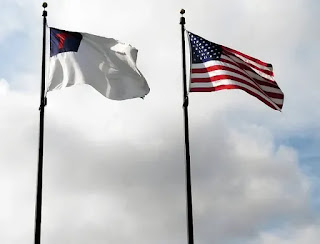I remember the first time I was exposed to the idea of male privilege. I can't say I was initially receptive, mostly due to the accusatory manner in which it was presented. And yet, I now marvel that I ever had trouble grasping it. Part of what we mean by the various forms of privilege and how they work in society is that they tend to be virtually invisible to the group(s) that possess them. As a man, it was no wonder that I didn't immediately recognize male privilege. That's kind of the point, in fact. The same was true of White privilege. It took me some time to get it, but it is now strange to think that there was ever a time when I didn't get it.
How about Christian privilege? Is there such a thing, and if so, how might we help Christians understand it? From where I'm sitting in one of the most religious states in the U.S., Christian privilege is not only real but pervasive and oppressive. Oppressive? Yes, it often reminds me of the sensation of someone sitting on my chest while I am trying to breathe. It is not a pleasant experience.
Much like male privilege, White privilege, and the like, the easiest way to recognize Christian privilege and begin the process of explaining it to others is probably by considering some examples:
- An American Christian can affix a Jesus fish to his or her car without having to give vandalism a second thought. I do not get to place any sort of symbol promoting science, reason, or atheism on my car for fear of vandalism or assault. The same goes for t-shirts.
- Florida and a handful of other states exempt faith-based day-care centers from state inspection and licensing while requiring both of secular day-care centers.
- Christian billboards are commonplace; atheist billboards are typically met with vandalism, protests, and angry calls to the billboard owner.
- Public school teachers may come under fire for criticizing religion but are expected to criticize every other form of idiocy.
- Promoting Christmas (and many other aspects of Christianity) in the workplace is common; saying "happy holidays" is considered offensive.
- Many of the same Christians who think nothing of subjecting non-Christians to sectarian prayer would lose their shit if the roles were reversed.
- Christians in the U.S. regularly refer to "god" as if everyone knows which god they are talking about.
- Christians demand (and often receive) preferential treatment under the law, even in cases involving public health. This raises questions about whether something similar may happen in criminal trials.
- Elected officials regularly use their offices to promote Christianity and prevent the hiring of non-Christians.
- The mainstream news media caters to Christians and regularly delegitimizes atheists.
- Atheists living in predominately religious parts of the U.S. are often reluctant to do something as simple as identifying themselves as atheists because they will face negative consequences for doing so. Christians have no such concerns.
Christian privilege is not something of which most Christians are conscious. Most do not think about it because they do not have to. Here's how Austin Cline put it (update: link no longer active):
A nonconscious ideology is analogous to the water fish swim in: fish don’t think of the water as wet because this environment is all they know — it structures their experience of life itself. Water simply is. Members of privileged groups don’t have to think about their environment because, for them, that environment simply is. They don’t have to be concerned about others’ opinions because it’s safe to assume that most think like them.
A worthwhile goal for all atheists living in predominately Christian countries where Christian privilge flourishes involves working to end it. And yes, the same is true for religious privilege more broadly. We deserve nothing less.
